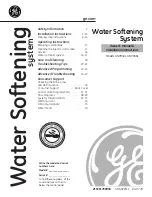
26
Note:
To prevent exhausting products from circulating to the air
intake in windy/cold areas, the maximum practical distance
between these two terminals is recommended.
Figure 19. Sidewall Intake/Exhaust Separation Clearance
DIRECT VENT AIR INTAKE MOISTURE PROTECTION
The air intake piping in a direct vent system will normally not have
any moisture accumulation in it. However, in certain cases, moisture
may build up and needs to be drained. Typical situations include,
but are not limited to:
•
Cold outdoor temperature, particularly if the air inlet is short,
•
Heater being used mostly for space heating and
•
Air inlet pipe has vertical rise near the heater.
Installations with any of these conditions are required to provide a
moisture drain with a trap that flows to a waste drain. See
to
(page 31). A horizontal section of the air inlet pipe, near
the heater should include a 2” by 2” by 1/2” tee and a hose barb fitting
to drain the water. The tee should be as close to the heater as is
practical. The drain tubing in any installation should have a loop trap
and flow to an appropriate waste drain. The air intake drain line must
be entirely separate from the exhaust vent outlet condensate line.
INSTALLATION SEQUENCE
1.
After the points of termination have been determined,
use the cover plates as templates to mark the holes for
the vent pipes to be inserted through the wall.
BEWARE OF
CONCEALED WIRING AND PIPING INSIDE OF WALL
. If the
vent terminals are being installed on the outside of a finished wall,
it may be easier to mark both the inside and outside wall. Align
the holes by drilling a hole through the center of the template
from the inside through to the outside. The template can now
be positioned on the outside wall using the drilled holes as a
centering point for the template.
A.
MASONRY SIDE WALLS
Chisel an opening approximately
1/2” (1.3 cm) larger than the marked circle.
B.
WOODEN SIDE WALLS
Drill a pilot hole approximately one
quarter inch outside of the marked circle. This pilot hole is
used as a starting point for a saws-all or sabre saw blade.
Cut around the marked circle staying approximately one
quarter inch outside of the line. (This will allow the vent pipe
to easily slide through the opening. The resulting gap will
be covered by the vent terminal cover plates.) Repeat this
step on the inside wall if necessary.
2.
Cut a length of pipe about 3.5” (8.9 cm) longer than the wall
thickness at the opening.
3.
Glue the air intake terminal to the section of the pipe.
4.
Slide the wall plate over pipe to stop against air intake terminal.
5.
Place a bead of caulking (not supplied) around the gap between
the pipe and the wall. Place some of the caulking on the back of
the plate to hold it against the wall after installation.
6.
If the air intake pipe is installed up to the wall, with a coupling
on the end against the wall opening, the pipe with the air intake
terminal can be prepared for gluing before inserting through the
wall. Slide the pipe through the wall and insert into coupling on
the other side of the wall, making sure that the air intake terminal
ends up pointed in the correct position. See
Figure 20. Side-Wall Intake/Exhaust Termination Installation
VERTICAL VENT TERMINAL INSTALLATION
WHEN TERMINATING THROUGH A ROOF, THE FOLLOWING
SPECIFICATIONS PERTAINING TO TERMINAL LOCATION MUST
BE FOLLOWED.
1.
Proper support must be provided for all pipe protruding through
the roof.
2.
The vertical roof terminations should be sealed with a plumbing
roof boot or equivalent flashing.
3.
The air intake termination and the exhaust vent termination must
penetrate the same side of roof.
4.
The center line of the air intake termination and the center line of
the exhaust vent termination must be no closer than 24” (61cm).
and
FLAT ROOF INSTALLATION
On flat roof installations the air intake and the exhaust vent
terminations must be a minimum of 18" (450 mm) above any
parapet, vertical wall or structure within 18" (450 mm) horizontally.
See
Summary of Contents for 300 Series
Page 66: ...66 NOTES NOTES...
Page 67: ...67 NOTES NOTES...
















































